散文翻译练习二
- 格式:docx
- 大小:15.33 KB
- 文档页数:2

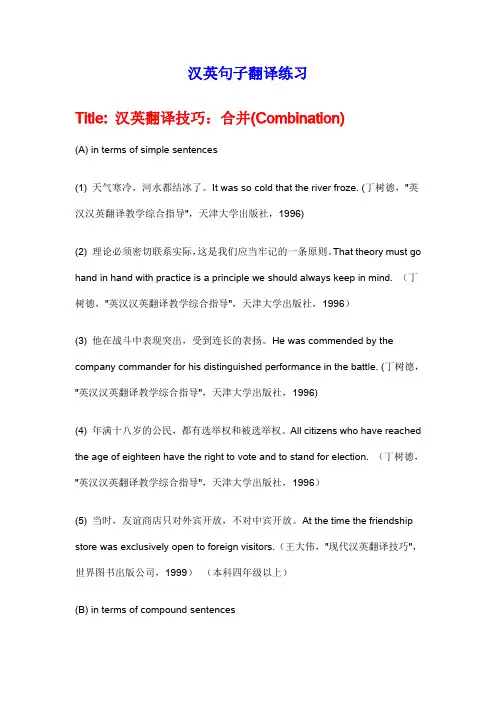
汉英句子翻译练习Title: 汉英翻译技巧:合并(Combination)(A) in terms of simple sentences(1) 天气寒冷,河水都结冰了。
It was so cold that the river froze. (丁树德,"英汉汉英翻译教学综合指导",天津大学出版社,1996)(2) 理论必须密切联系实际,这是我们应当牢记的一条原则。
That theory must go hand in hand with practice is a principle we should always keep in mind. (丁树德,"英汉汉英翻译教学综合指导",天津大学出版社,1996)(3) 他在战斗中表现突出,受到连长的表扬。
He was commended by the company commander for his distinguished performance in the battle. (丁树德,"英汉汉英翻译教学综合指导",天津大学出版社,1996)(4) 年满十八岁的公民,都有选举权和被选举权。
All citizens who have reached the age of eighteen have the right to vote and to stand for election. (丁树德,"英汉汉英翻译教学综合指导",天津大学出版社,1996)(5) 当时,友谊商店只对外宾开放,不对中宾开放。
At the time the friendship store was exclusively open to foreign visitors.(王大伟,"现代汉英翻译技巧",世界图书出版公司,1999)(本科四年级以上)(B) in terms of compound sentences(6) 她对自己所取得的成就充满了自豪,这也不是没有道理的。
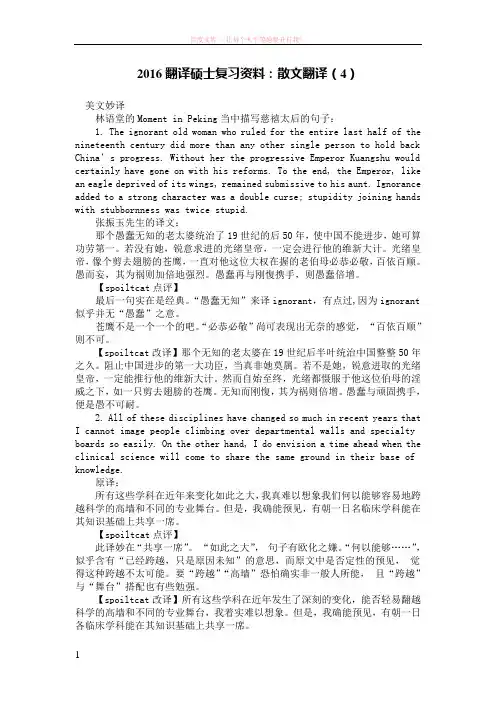
2016翻译硕士复习资料:散文翻译(4)美文妙译林语堂的Moment in Peking当中描写慈禧太后的句子:1. The ignorant old woman who ruled for the entire last half of the nineteenth century did more than any other single person to hold back China’s progress. Without her the progressive Emperor Kuangshu would certainly have gone on with his reforms. To the end, the Emperor, like an eagle deprived of its wings, remained submissive to his aunt. Ignorance added to a strong character was a double curse; stupidity joining hands with stubbornness was twice stupid.张振玉先生的译文:那个愚蠢无知的老太婆统治了19世纪的后50年,使中国不能进步,她可算功劳第一。
若没有她,锐意求进的光绪皇帝,一定会进行他的维新大计。
光绪皇帝,像个剪去翅膀的苍鹰,一直对他这位大权在握的老伯母必恭必敬,百依百顺。
愚而妄,其为祸则加倍地强烈。
愚蠢再与刚愎携手,则愚蠢倍增。
【spoiltcat点评】最后一句实在是经典。
“愚蠢无知”来译ignorant,有点过,因为ignorant 似乎并无“愚蠢”之意。
苍鹰不是一个一个的吧。
“必恭必敬”尚可表现出无奈的感觉,“百依百顺”则不可。
【spoiltcat改译】那个无知的老太婆在19世纪后半叶统治中国整整50年之久。
阻止中国进步的第一大功臣,当真非她莫属。
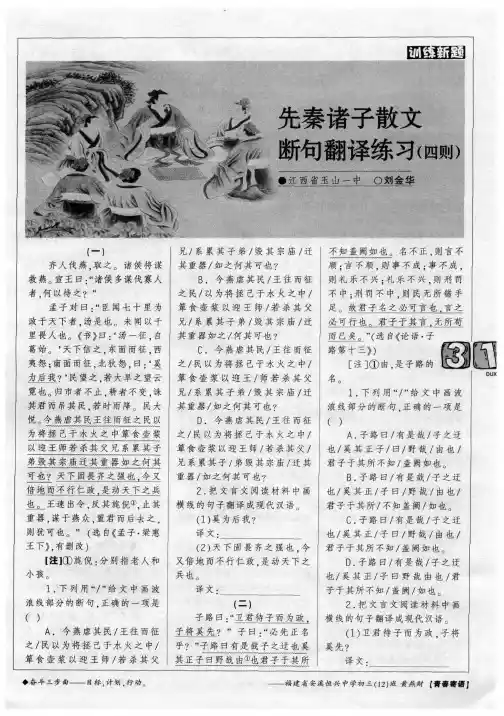
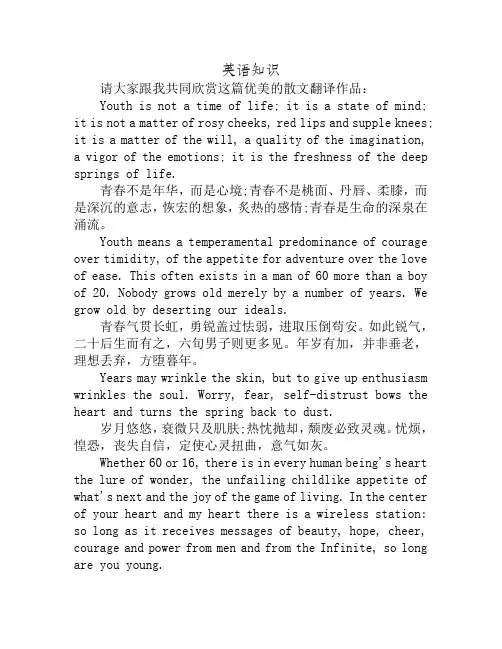
英语知识请大家跟我共同欣赏这篇优美的散文翻译作品:Youth is not a time of life; it is a state of mind; it is not a matter of rosy cheeks, red lips and supple knees; it is a matter of the will, a quality of the imagination, a vigor of the emotions; it is the freshness of the deep springs of life.青春不是年华,而是心境;青春不是桃面、丹唇、柔膝,而是深沉的意志,恢宏的想象,炙热的感情;青春是生命的深泉在涌流。
Youth means a temperamental predominance of courage over timidity, of the appetite for adventure over the love of ease. This often exists in a man of 60 more than a boy of 20. Nobody grows old merely by a number of years. We grow old by deserting our ideals.青春气贯长虹,勇锐盖过怯弱,进取压倒苟安。
如此锐气,二十后生而有之,六旬男子则更多见。
年岁有加,并非垂老,理想丢弃,方堕暮年。
Years may wrinkle the skin, but to give up enthusiasm wrinkles the soul. Worry, fear, self-distrust bows the heart and turns the spring back to dust.岁月悠悠,衰微只及肌肤;热忱抛却,颓废必致灵魂。
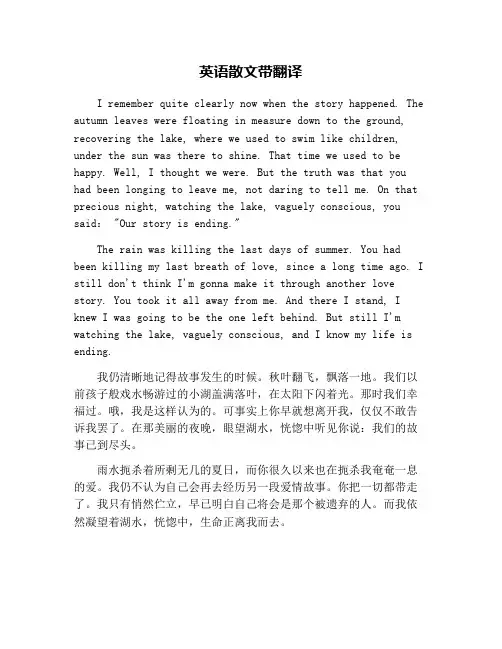
英语散文带翻译I remember quite clearly now when the story happened. The autumn leaves were floating in measure down to the ground, recovering the lake, where we used to swim like children, under the sun was there to shine. That time we used to be happy. Well, I thought we were. But the truth was that you had been longing to leave me, not daring to tell me. On that precious night, watching the lake, vaguely conscious, you said: "Our story is ending."The rain was killing the last days of summer. You had been killing my last breath of love, since a long time ago. I still don't think I'm gonna make it through another love story. You took it all away from me. And there I stand, I knew I was going to be the one left behind. But still I'm watching the lake, vaguely conscious, and I know my life is ending.我仍清晰地记得故事发生的时候。
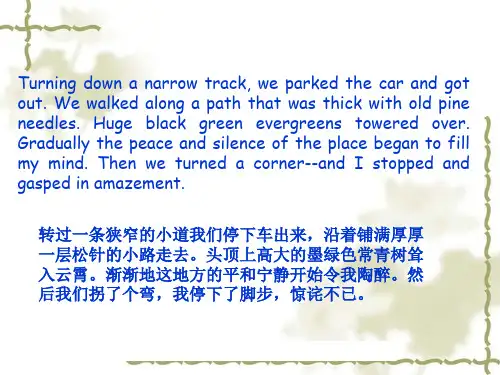
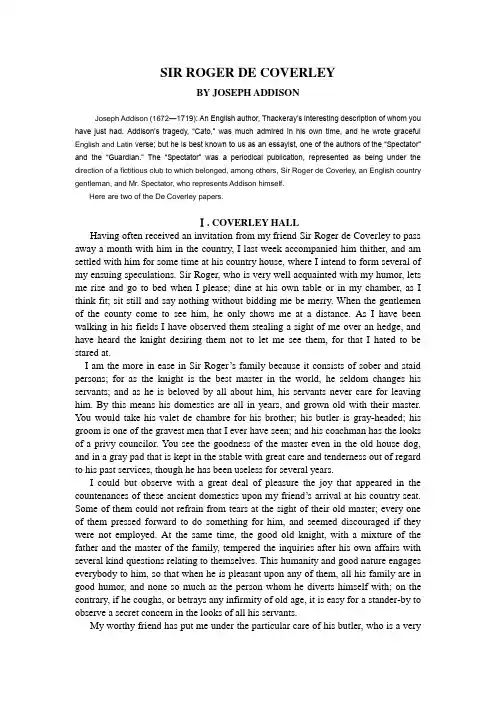
SIR ROGER DE COVERLEYBY JOSEPH ADDISONJoseph Addison (1672—1719): An English author, Thackeray’s interesting description of whom you have just had. Addison’s tragedy, “Cato,” was much admired in his own time, and he wrote graceful English and Latin verse; but he is best known to us as an essayist, one of the authors of the “Spectator” and the “Guardian.” The “Spectator” was a periodical publication, represented as being under the direction of a fictitious club to which belonged, among others, Sir Roger de Coverley, an English country gentleman, and Mr. Spectator, who represents Addison himself.Here are two of the De Coverley papers.Ⅰ. COVERLEY HALLHaving often received an invitation from my friend Sir Roger de Coverley to pass away a month with him in the country, I last week accompanied him thither, and am settled with him for some time at his country house, where I intend to form several of my ensuing speculations. Sir Roger, who is very well acquainted with my humor, lets me rise and go to bed when I please; dine at his own table or in my chamber, as I think fit; sit still and say nothing without bidding me be merry. When the gentlemen of the county come to see him, he only shows me at a distance. As I have been walking in his fields I have observed them stealing a sight of me over an hedge, and have heard the knight desiring them not to let me see them, for that I hated to be stared at.I am the more in ease in Sir Roger’s family because it consists of sober and staid persons; for as the knight is the best master in the world, he seldom changes his servants; and as he is beloved by all about him, his servants never care for leaving him. By this means his domestics are all in years, and grown old with their master. You would take his valet de chambre for his brother; his butler is gray-headed; his groom is one of the gravest men that I ever have seen; and his coachman has the looks of a privy councilor. You see the goodness of the master even in the old house dog, and in a gray pad that is kept in the stable with great care and tenderness out of regard to his past services, though he has been useless for several years.I could but observe with a great deal of pleasure the joy that appeared in the countenances of these ancient domestics upon my friend’s arrival at his country seat. Some of them could not refrain from tears at the sight of their old master; every one of them pressed forward to do something for him, and seemed discouraged if they were not employed. At the same time, the good old knight, with a mixture of the father and the master of the family, tempered the inquiries after his own affairs with several kind questions relating to themselves. This humanity and good nature engages everybody to him, so that when he is pleasant upon any of them, all his family are in good humor, and none so much as the person whom he diverts himself with; on the contrary, if he coughs, or betrays any infirmity of old age, it is easy for a stander-by to observe a secret concern in the looks of all his servants.My worthy friend has put me under the particular care of his butler, who is a veryprudent man, and, as well as the rest of his fellow-servants, wonderfully desirous of pleasing me, because they have often heard their master talk of me as of his particular friend.My chief companion, when Sir Roger is diverting himself in the woods or the fields, is a very venerable man, who is ever with Sir Roger, and has lived at his house in the nature of a chaplain above thirty years. This gentleman is a person of good sense and some learning, of a very regular life and obliging conversation; he heartily loves Sir Roger, and knows that he is very much in the old knight’s esteem, so that he lives in the family rather as a relation than a dependant.I have observed in several of my papers that my friend, Sir Roger, amidst all his good qualities, is something of an humorist; and that his virtues as well as imperfections are, as it were, tinged by a certain extravagance, which makes them particularly his and distinguishes them from those of other men. This cast of mind, as it is generally very innocent in itself, so it renders his conversation highly agreeable and more delightful than the same degree of sense and virtue would appear in their common and ordinary colors. As I was walking with him last night, he asked me how I liked the good man whom I have just now mentioned; and, without staying for my answer, told me that he was afraid of being insulted with Latin and Greek at his own table, for which reason he desired a particular friend of his at the university to find him out a clergyman rather of plain sense than much learning, of a good aspect, a clear voice, a sociable temper, and, if possible, a man that understood a little of backgammon.“My friend,”says Sir Roger, “found me out this gentleman, who, besides the endowments required of him, is, they tell me, a good scholar, though he does not show it. I have given him the parsonage of the parish; and because I know his value, have settled upon him a good annuity for life. If he outlives me, he shall find that he was higher in my esteem than perhaps he thinks he is. He has now been with me thirty years, and, though he does not know I have taken notice of it, has never in all that time asked anything of me for himself, though he is every day soliciting me for something in behalf of one or other of my tenants, his parishioners. There has not been a lawsuit in the parish since he has lived : among them. If any dispute arises, they apply themselves to him for the decision; if they do not acquiesce in his judgment, which I think never happened above once or twice at most, they appeal to me. At his first settling with me, I made him a present of all the good sermons which have been printed in English, and only begged of him that every Sunday he would pronounce one of them in the pulpit. Accordingly, he has digested them into such a series that they follow one another naturally, and make a continued system of practical divinity.”As Sir Roger was going on with his story, the gentleman we were talking of came up to us, and upon the knight’s asking him who preached to-morrow—for it was Saturday night—told us the Bishop of St. Asaph in the morning and Dr. South in the afternoon. He then showed us his list of preachers for the whole year, where I saw with a great deal of pleasure Archbishop Tillotson, Bishop Saunderson, Dr. Barrow, Dr. Calamy, with several living authors who have published discourses of practicaldivinity. I no sooner saw this venerable man in the pulpit, but I very much approved of my friend’s insisting upon the qualifications of a good aspect and a clear voice; for I was so charmed with the gracefulness of his figure and delivery, as well as with the discourses he pronounced, that I think I never passed any time more to my satisfaction.Ⅱ. SIR ROGER PASSETH AWAYWe last night received a piece of ill news at our club, which very sensibly afflicted every one of us. I question not but my readers themselves will be troubled at the hearing of it. To keep them no longer in suspense, Sir Roger de Coverley is dead. He departed this life at his house in the country, after a few weeks’ sickness. Sir Andrew Freeport has a letter from one of his correspondents in those parts that informs him the old man caught a cold at the county sessions as he was very warmly promoting an address of his own penning, in which he succeeded according to his wishes. But this particular comes from a Whig justice of peace who was always Sir Roger’s enemy and antagonist. I have letters both from the chaplain and Captain Sentrey which mention nothing of it, but are filled with many particulars to the honor of the good old man. I have likewise a letter from the butler, who took so much care of me last summer when I was at the knight’s house. As my friend the butler mentions, in the simplicity of his heart, several circumstances the others have passed over in silence, I shall give my reader a copy of his letter without any alteration or diminution: —“HONORED SIR,—Knowing that you was my old master’s good friend, I could not forbear sending you the melancholy news of his death, which has afflicted the whole country, as well as his poor servants, who loved him, I may say, better than we did our lives. I am afraid he caught his death the last county sessions, where he would go to see justice done to a poor widow woman and her fatherless children, that had been wronged by a neighboring gentleman; for you know, sir, my good master was always the poor man’s friend. Upon his coming home, the first complaint he made was that he had lost his roast-beef stomach, not being able to touch a sirloin which was served up according to custom; and you know he used to take great delight in it. From that time forward he grew worse and worse, but still kept a good heart to the last. Indeed, we were once in great hope of his recovery, upon a kind message that was sent him from the widow lady whom he had made love to the last forty years of his life; but this only proved a lightning before his death. He has bequeathed to this lady, as a token of his love, a great pearl necklace and a couple of silver bracelets set with jewels, which belonged to my good old lady his mother; he has bequeathed the fine white gelding, that he used to ride a-hunting upon, to his chaplain, because he thought he would be kind to him; and has left you all his books. He has, moreover, bequeathed to the chaplain a very pretty tenement with good lands about it. It being a very cold day when he made his will, he left for mourning to every man in the parish a great frieze coat and to every woman a black riding-hood. It was a most moving sight to see him take leave of his poor servants, commending us all for our fidelity, whilst we were not able to speak a word for weeping. As we most of us are grown gray-headed in our dear master’s service, he has left us pensions and legacies which we may live very comfortably upon the remaining part of our days. He has bequeathed a great dealmore in charity which is not yet come to my knowledge, and it is peremptorily said in the parish that he has left money to build a steeple to the church; for he was heard to say some time ago that if he lived two years longer, Coverley Church should have a steeple to it. The chaplain tells everybody that he made a very good end, and never speaks of him without tears. He was buried, according to his own directions, among the family of the Coverleys, on the left hand of his father, Sir Arthur. The coffin was carried by six of his tenants, and the pall held up by six of the quorum; the whole parish followed the corpse with heavy hearts, and in their mourning suits—the men in frieze and the women in riding-hoods. Captain Sentrey, my master’s nephew, has taken possession of the Hall-house and the whole estate. When my old master saw him a little before his death, he shook him by the hand, and wished him joy of the estate which was falling to him, desiring him only to make a good use of it and to pay the several legacies and the gifts of charity which he told him he had left as quitrents upon the estate. The captain truly seems a courteous man, though he says but little. He makes much of those whom my master loved, and shows great kindness to the old house dog that you know my poor master was so fond of. It would have gone to your heart to have heard the moans the dumb creature made on the day of my master’s death. He has never joyed himself since; no more has any of us. ’Twas the melancholiest day for the poor people that ever happened in Worcestershire. This is all from,“Honored sir, your most sorrowful servant,“EDWARD BISCUIT.“P. S.—My master desired, some weeks before he died, that a book which comes up to you by the carrier should be given to Sir Andrew Freeport, in his name.”This letter, notwithstanding the poor butler’s manner of writing it, gave us such an idea of our good old friend that upon the reading of it there was not a dry eye in the dub. Sir Andrew, opening the book, found it to be a collection of Acts of Parliament. There was in particular, the act of Uniformity, with some passages in it marked by Sir Roger’s own hand. Sir Andrew found that they related to two or three points which he had disputed with Sir Roger the last time he appeared at the club. Sir Andrew, who would have been merry at such an incident on another occasion, at the sight of the old man’s handwriting burst into tears, and put the book in his pocket. Captain Sentrey informs us that the knight has left rings and mourning for every one in the club.。
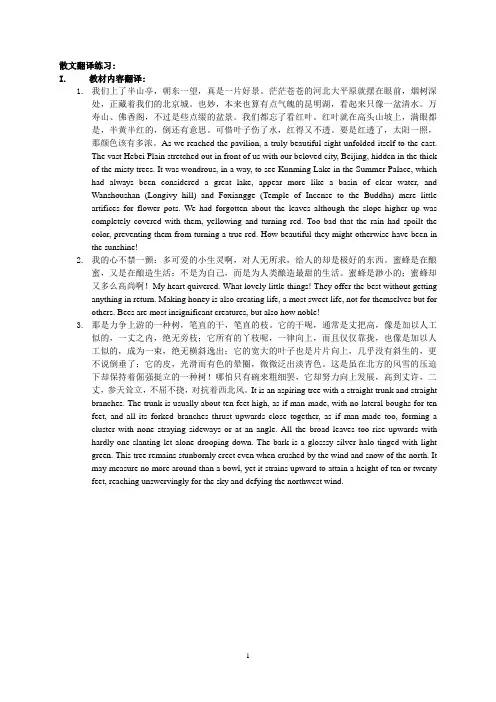
散文翻译练习:I.教材内容翻译:1.我们上了半山亭,朝东一望,真是一片好景。
茫茫苍苍的河北大平原就摆在眼前,烟树深处,正藏着我们的北京城。
也妙,本来也算有点气魄的昆明湖,看起来只像一盆清水。
万寿山、佛香阁,不过是些点缀的盆景。
我们都忘了看红叶。
红叶就在高头山坡上,满眼都是,半黄半红的,倒还有意思。
可惜叶子伤了水,红得又不透。
要是红透了,太阳一照,那颜色该有多浓。
As we reached the pavilion, a truly beautiful sight unfolded itself to the east.The vast Hebei Plain stretched out in front of us with our beloved city, Beijing, hidden in the thick of the misty trees. It was wondrous, in a way, to see Kunming Lake in the Summer Palace, which had always been considered a great lake, appear more like a basin of clear water, and Wanshoushan (Longivy hill) and Foxiangge (Temple of Incense to the Buddha) mere little artifices for flower pots. We had forgotten about the leaves although the slope higher up was completely covered with them, yellowing and turning red. Too bad that the rain had spoilt the color, preventing them from turning a true red. How beautiful they might otherwise have been in the sunshine!2.我的心不禁一颤:多可爱的小生灵啊,对人无所求,给人的却是极好的东西。
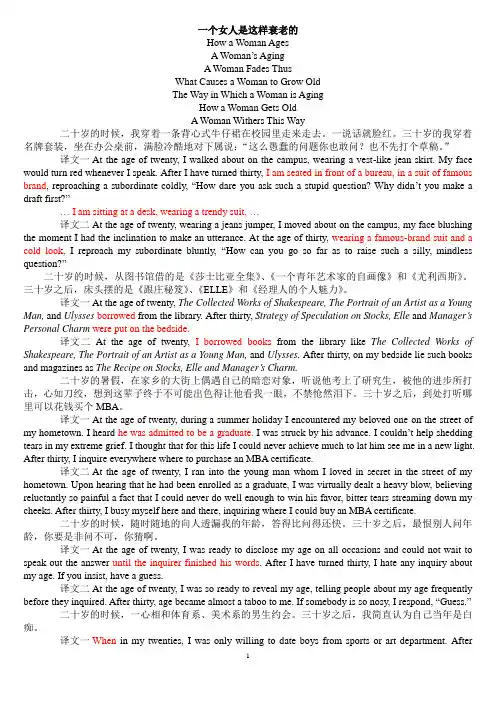
一个女人是这样衰老的How a Woman AgesA Woman’s AgingA Woman Fades ThusWhat Causes a Woman to Grow OldThe Way in Which a Woman is AgingHow a Woman Gets OldA Woman Withers This Way二十岁的时候,我穿着一条背心式牛仔裙在校园里走来走去。
一说话就脸红。
三十岁的我穿着名牌套装,坐在办公桌前,满脸冷酷地对下属说:“这么愚蠢的问题你也敢问?也不先打个草稿。
”译文一At the age of twenty, I walked about on the campus, wearing a vest-like jean skirt. My face would turn red whenever I speak. After I have turned thirty, I am seated in front of a bureau,in a suit of famous brand, reproaching a subordinate coldly, “How dare you ask such a stupid question? Why didn’t you make a draft first?”… I am sitting at a desk, wearing a trendy suit, …译文二At the age of twenty, wearing a jeans jumper, I moved about on the campus, my face blushing the moment I had the inclination to make an utterance. At the age of thirty, wearing a famous-brand suit and a cold look, I reproach my subordinate bluntly, “How can you go so far as to raise such a silly, mindless question?”二十岁的时候,从图书馆借的是《莎士比亚全集》、《一个青年艺术家的自画像》和《尤利西斯》。
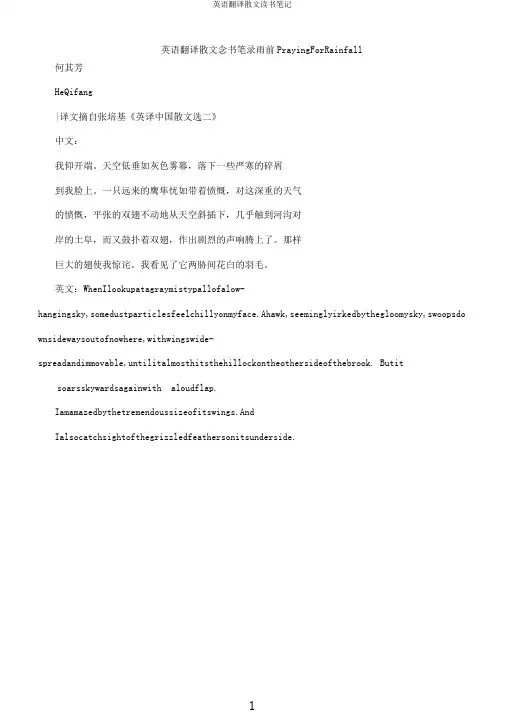
英语翻译散文念书笔录雨前PrayingForRainfall何其芳HeQifang|译文摘自张培基《英译中国散文选二》中文:我仰开端。
天空低垂如灰色雾幕,落下一些严寒的碎屑到我脸上。
一只远来的鹰隼忧如带着愤慨,对这深重的天气的愤慨,平张的双翅不动地从天空斜插下,几乎触到河沟对岸的土阜,而又鼓扑着双翅,作出剧烈的声响腾上了。
那样巨大的翅使我惊诧。
我看见了它两胁间花白的羽毛。
英文:WhenIlookupatagraymistypallofalow-hangingsky,somedustparticlesfeelchillyonmyface.Ahawk,seeminglyirkedbythegloomysky,swoopsdo wnsidewaysoutofnowhere,withwingswide-spreadandimmovable,untilitalmosthitsthehillockontheothersideofthebrook. Butit soarsskywardsagainwith aloudflap.Iamamazedbythetremendoussizeofitswings.AndIalsocatchsightofthegrizzledfeathersonitsunderside.重点:1,“天空低垂如灰色雾幕”译为agraymistypallof通alow–hangingsky, 等于alow-hangingskyresemblingagraymistypall.相同的栗子如:atoyofahouse=atoy-likehouse,adwarfofaman=adwarf–likeaman.2,”远来的“译为outofnowhere(不知从哪儿来的),常我们译为comingfromafar,但前者更加传神贴切。
3,“深重的天气”是一个移就修辞格的表达,作者把原来属于形容人的心情的“深重”转移到形容非生命的“天空”,译为thegloomysky,也能够参照第一段译为leadensky综述:在描绘“鹰“时,译者又运用了大批生动形象的动词。
张培基英译散文赏析雨前Praying For Rainfall何其芳He Qifang| 译文摘自张培基《英译中国散文选二》中文:我怀想着故乡的雷声和雨声。
那隆隆的有力的搏击,从山谷返响到山谷,仿佛春之芽就从冻土里震动,惊醒,而怒茁出来。
细草样柔的雨丝又以温存之手抚摸它,使它簇生油绿的枝叶而开出红色的花。
这些怀想如乡愁一样萦绕得使我忧郁了。
我心里的气候也和这北方大陆一样缺少雨量,一滴温柔的泪在我枯涩的眼里,如迟疑在这阴沉的天空里的雨点,久不落下。
英文:I can never forget the thunderstorm we often had in my home town. Over there, whenever the rumble of thunder reverberated across the valley, the buds of spring would seem to sprout freelyafter being disturbed and roused up from their slumber in the frozen soil. Then tenderly stroked by the soft hands of fine rain, they would putforth bright green leaves and pink flowers. Itmakes me nostalgic and melancholy to think about the old times and my mind is as depressed as the vast expanse of North China is thirsty. A tear stands in my dull eye and, like the rainlingering in the murky sky, is slow to roll down.要点:1,“那隆隆的有力的搏击,从山谷返响到山谷,仿佛春之芽就从冻土里震动,惊醒,而怒茁出来。
文学翻译练习题文学翻译是一项既具挑战性又有趣味性的任务。
在翻译文学作品时,译者需要将原作中的情感、意境以及作者的用词风格准确传达给读者。
这就要求译者对原作进行深入理解,同时具备出色的语言表达能力。
在本文中,将通过几个练习题,来帮助读者提升文学翻译的技巧与能力。
练习题一:小说片段翻译以下是一段小说片段,请尝试将其翻译成你所熟悉的语言。
"Sitting alone in the cozy cafe, Lily watched the raindrops race down the windowpane. Each drop seemed to carry a world of memories, washingaway the pain and sadness that had haunted her for months. The aroma of freshly brewed coffee filled the air, blending with the sound of quiet conversations and occasional laughter. She sipped her coffee, feeling a sense of calm wash over her. In that moment, she knew she had found solace."练习题二:诗歌翻译以下是一首诗歌,请尝试将其翻译成你所熟悉的语言,并保持其韵律和意境。
The autumn leaves, so golden and bright,Dancing in the wind, a mesmerizing sight.As they gently fall, painting the ground,Whispering secrets, without a sound.练习题三:戏剧对白翻译以下是一段戏剧对白,请尝试将其翻译成你所熟悉的语言,并准确传达角色之间的情感和台词的意义。
Translation Exercises (from English into Chinese)1. The OrangeOf the fruits of the year I give my vote to the orange. In the first place it is a perennial--if not in actual fact, at least in the greengrocer’s shop. On the days when dessert is a name given to a handful of chocolates and a little preserved ginger, when macédoine de fruits is the title bestowed on some raisins and two prunes, then the orange, however sour, comes nobly to the rescue; and on those other days of plenty when cherries and strawberries and kiwi-fruits riot together upon the table, the orange, sweeter than ever, is still there to hold its own. Bread and rice, beef and mutton, eggs and milk, are not more necessary to an ordered existence than the orange.It is well that the commonest fruit shouldbe also the best. Of the virtues of the orange I have not room fully to speak. It has properties of health giving, as it cures influenza and establishes the complexion. It is clean, for whoever handles it on its way to your table but handles its outer covering, its top coat, which is left in the hall. It is round, and forms an excellent substitute with the young for a tiny football. The pips can be flicked at your enemies, and quite a small piece of peel makes a slide for an old gentleman.But all this would count nothing had not the orange such delightful qualities of taste.I dare not let myself go upon this subject. I am a slave to its sweetness.Yet with the orange we go live year in and year out. That speaks well for the orange. The fact is that there is an honesty about the orange which appeals to all of us. If it is going to be bad--for the best of us are bad sometimes--it begins to be bad from theoutside, not from the inside. How many a pear which presents a blooming face to the world is rotten at the core. How many an innocent-looking apple, is harboring a worm in the bud. But the orange has no secret faults. Its outside is a mirror of its inside, and if you are quick you can tell the shopman so before he slips it into the bag.2.But, as has been true in many other cases, when they were at last married, the most ideal of situations was found to have been changed to the most practical. Instead of having shared their original duties, and as school-boys would say, going halves, they discovered that the cares of life had been doubled. This led to some distressing moments for both our friends; they understood suddenly that instead of dwelling in heaven they were still upon earth, and had made themselves slaves tonew laws and limitations. Instead of being freer and happier than ever before, they had assumed new responsibilities; they had established a new household, and must fulfill in some way or another the obligations of it. They looked back with affection to their engagement; they had been longing to have each other to themselves, apart from the world, but it seemed they never felt so keenly that they were still units in modern society.3.We, the human species, are confronting a planetary emergency - a threat to the survival of our civilization that is gathering ominous and destructive potential even as we gather here. But there is hopeful news as well: we have the ability to solve this crisis and avoid the worst - though not all - of its consequences, if we act boldly, decisively and quickly.However, too many of the world's leaders are still best described in the words of Winston Churchill applied to those who ignored Adolf Hitler's threat: "They go on in strange paradox, decided only to be undecided, resolved to be irresolute, all powerful to be impotent."So today, we dumped another 70 million tons of global-warming pollution into the thin shell of atmosphere surrounding our planet, as if it were an open sewer. And tomorrow, we will dump a slightly larger amount, with the cumulative concentrations now trapping more and more heatfrom the sun.4.Scientific and technological advances are enabling us to comprehend the furthest reaches of the cosmos, the most basic constituents of matter, and the miracle of life. At the same time, today, the actions,and inaction, of human beings imperil not only life on the planet, but the very life of the planet.Globalization is making the world smaller, faster and richer. Still, 9/11, avian flu, and Iran remind us that a smaller, faster world is not necessarily a safer world.Our world is bursting with knowledge - but desperately in need of wisdom. Now, when sound bites are getting shorter, when instant messages crowd out essays, and when individual lives grow more frenzied, college graduates capable of deep reflection are what our world needs.For all these reasons I believed - and I believe even more strongly today - in the unique and irreplaceable mission of universities.5.For me the most interesting thing about asolitary life, and mine has been that for the last twenty years, is that it becomes increasingly rewarding. When I can wake up and watch the sun rise over the ocean, as I do most days, and know that I have an entire day ahead, uninterrupted, in which to write a few pages, take a walk with my dog, read and listen to music, I am flooded with happiness.I’m lonely only when I am overtired, when I have worked too long without a break, when fro the time being I feel empty ad need filling up. And I am lonely sometimes when I come back home after a lecture trip, when I have seen a lot of people and talked a lot, and am full to the brim with experience that needs to be sorted out.Then for a little while the house feels huge and empty, and I wonder where my self is hiding. It has to be recaptured slowly by watering the plants and perhaps,by looking again at each one as though it were a person.It takes a while, as I watch the surf blowing up in fountains, but the moment comes when the worlds falls away, and the self emerges again from the deep unconscious, bringing back all I have recently experienced to be explored and slowly understood.6. SkiingThere is, perhaps, no other sport in the world quite so exciting as skiing. For viewers, it is a spectacle of unsurpassed beauty. For skiers, it is a vivid personal experience, a thrilling test of mind, muscle and nerves.More and more Americans are discovering this thrill for themselves. Not too long ago, skiing had virtually no part in the American sport scene. If it were thought of at all, it was purely as a European sport. Then came the 1932 winter Olympics at Lake Placid, New York. Americans got their first goodlook at skiing and made for the hills. Today ski trains make regular runs from our cities to the great, white outdoors.In addition to joy and exhilaration, skiing offers other attractions. It is a comparatively inexpensive sport, and, for the young, the art of skiing is often mastered in a very short time.The special thrill of skiing is well described by Suddy Werner. "It's all up to you," he says, "No teammates can help. You're alone. It's you against the snow, the mountains, yourself. You're a warrior."7. An Act in Modern Diplomatic HistoryThat afternoon, the greatest disappearing act in modern diplomatic history was to unfold. It had all been worked out meticulously in advance between the White House and Pakistan's President Yahya Khan.The plan worked smoothly. First,Kissinger paid a ninety minute courtesy call on the President. Next, the word went out, as previously arranged, that the visiting American, exhausted by the long journey, would have to cancel a formal dinner in his honor and would be driven to the eighty- five-hundred-foot-high hill station of Nathia Gali for a brief rest. The next day, July 9, the Pakistan government announced that Kissinger would be forced to extend his stay in Nathia Gali because of a "slight indisposition"—"Delhi belly"; some reporters called it, a common enough problem for fast- moving travelers.As part of the cover, the trip to Nathia Gali was to be as conspicuous as possible. So a decoy caravan of limousines, flying the flags of the United States and Pakistan and accompanied by a motorcycle escort, rolled through the streets of Islamabad and up into the mountains.To preserve the fiction, the governmentkept a steady stream of visitors driving from Islamabad to Nathin Gali to pay their respects to the indisposed traveler. The Chief of Staff of the Pakistan army, the Minister of Defense, and a score of other officials dropped in to inquire about Kissinger's health. All were intercepted by Khan. He'd serve them a cup of coffee and tell them that Kissinger was resting and could not be disturbed.Actually, Kissinger had never gone to Nathia Gali.8. First SnowThe first fall of snow is not only an event but it is a magical event. You go to bed in one kind of world and wake up to find yourself in another quite different, and if this is not enchantment, then where is it to be found? The very stealth, the eerie quietness, of the thing makes it more magical. If all the snow fell at once in one shattering crash, awakening us in the middle of the night the event would be robbed of its wonder. But it flutters down, soundless, hour after hour while we are asleep. Outside the closed curtains of the bedroom a vast transformation scene is taking place, just as if a myriad elves and brownies were at work, and we turn and yawn and stretch and know nothing about it. And then, what an extraordinary change it is! It is as if the house you are in had been dropped down in another continent. Even the inside, which has not been touched, seems different, every room appearing smaller and cosier, just as if some power were trying to turn it into a woodcutter's hut or a snug log-cabin. Outside, where the garden was yesterday, there is now a white and glistening level, and the village beyond is no longer your own familiar cluster of roofs but a village inan old German fairy-tale. You would not be surprised to learn that all the people there, the spectacled postmistress, the cobbler, the retired school master, and the rest, had suffered a change too and had become queer elvish beings, purveyors of invisible caps and magic shoes. You yourselves do not feel quite the same people you were yesterday. How could you when so much has been changed? There is a curious stir, a little shiver of excitement, troubling the house, not unlike the feeling there is abroad when a journey has to be made. The children, of course, are all excitement but even the adults hang about and talk to one another longer than usual before settling down to the day's work. Nobody can resist the windows. It is like being on board a ship.When I got up this morning the world was a chilled hollow of dead white and faint blues. The light that came through thewindows was very queer, and it contrived to make the familiar business of splashing and shaving and brushing and dressing very queer too. Then the sun came out, and by the time I had sat down to breakfast it was shining bravely and flushing the snow with delicate pinks. The dinningroom window had been transformed into a lovely Japanese print. The little plum-tree outside, with the faintly flushed snow lining its boughs and artfully disposed along its trunk, stood in full sunlight. An hour or two later everything was a cold glitter of white and blue. The world had completely changed again. The little Japanese prints had all vanished.9. At the Edge of the SeaThe shore is an ancient world, for as long as there has been an earth and sea there has been this place of the meeting of land and water. Yet it is a world that keeps alive thesense of continuing creation and of the relentless drive of life. Each time that I enter it, I gain some new awareness of its beauty and its deeper meanings, sensing that intricate fabric of life by which one creature is linked with another, and each with its surroundings.In my thoughts of the shore, one place stands apart for its revelation of exquisite beauty. It is a pool hidden within a cave that one can visit only rarely and briefly when the lowest of the year's low tides fall below it, and perhaps from that very fact it acquires some of its special beauty. Choosing such a tide, I hoped for a glimpse of the pool. The ebb was to fall early in the morning. I knew that if the wind held from the northwest and no interfering swell ran in from a distant storm the level of the sea should drop below the entrance to the pool. There had been sudden ominous showers in the night, with rain like handfuls of gravelflung on the roof. When I looked out into the early morning the sky was full of a gray dawn light but the sun had not yet risen. Water and air were pallid. Across the bay the moon was a luminous disc in the western sky, suspended above the dim line of distant shore─the full August moon, drawing the tide to the low, low levels of the threshold of the alien sea world. As I watched, a gull flew by, above the spruces. Its breast was rosy with the light of the unrisen sun. The day was, after all, to be fair.Later, as I stood above the tide near the entrance to the pool, the promise of that rosy light was sustained. From the base of the steep wall of rock on which I stood, a moss-covered ledge jutted seaward into deep water. In the surge at the rim of the ledge the dark fronds of oarweeds swayed, smooth and gleaming as leather. The projecting ledge was the path to the smallhidden cave and its pool. Occasionally a swell, stronger than the rest, rolled smoothly over the rim and broke in foam against the cliff. But the intervals between such swells were long enough to admit me to the ledge and long enough for a glimpse of that airypool, so seldom and so briefly exposed.And so I knelt on the wet carpet of sea moss and looked back into the dark cavern that held the pool in a shallow basin. The floor of the cave was only a few inches below the roof, and a mirror had been created in which all that grew on the ceiling was reflected in the still water below.Under water that was clear as glass the pool was carpeted with green sponge. Gray patches of sea squirts glistened on the ceiling and colonies of soft coral were a pale apricot color. In the moment when I looked into the cave a little elfin starfish hungdown, suspended by the merest thread, perhaps by only a single tube foot. It reached down to touch its own reflection, so perfectly delineated that there might have been, not one starfish, but two. The beauty of the reflected images and of the limpid pool itself was the poignant beauty of things that are ephemeral, existing only until the sea should return to fill the little cave.10. Yearning for Her LipsAs he gazed at her and listened, his thoughts grew daring. He reviewed all the wild delight of the pressure of her hand in his at the door, and longed for it again. His gaze wandered often towards her lips, and he yearned for them hungrily. But there was nothing gross or earthly about this yearning. It gave him exquisite delight to watch every movement and play of those lips as they enunciated the words she spoke; yet they were not ordinary lips such as all men andwomen had. Their substance was not mere human clay. They were lips of pure spirit, and his desire for them seemed absolutely different from the desire that had led him to other women’s lips. He could kiss her lips, rest his own physical lips upon them, but it would be with the lofty and awful fervor with which one would kiss the robe of God. He was not conscious of this transvalutation of values that had taken place in him, and was unaware that the light that shone in his eyes when he looked at her was quite the same light that shines in all men’s eyes when the desire of love is upon them.11. Confusion of MindAnd now, because my mind was not confused enough before, I complicated its confusion fifty thousand-fold by having states and season when I was clear that Biddy was immeasurably better than Estella, and that the plain honest workinglife to which I was born had nothing in it to be ashamed of, but offered me sufficient means of self-respect and happiness. At those times, I would decide conclusively that my disaffection to dear old Joe and the forge was gone, and that I was growing up in a fair way to be partners with Joe and to keep company with Biddy——when all in a moment some confounding remembrance of the Havisham days would fall upon me, like a destructive missile, and scatter my wits again. Scattered wits take a long time picking up; and often, before I had got them well together, they would be dispersed in all directions by one stray thought, that perhaps after all Miss Havisham was going to make my fortune when my time was out.12. How to readVirginia WoolfIt is simple enough to say that since books have classes — fiction, biography, poetry —we should separate them and take from each what it is right that each should give us. Yet few people ask from books what books can give us. Most commonly we come to books with blurred and divided minds, asking of fiction that it shall be true, of poetry that it shall be false, of biography that it shall be flattering, of history that it shall enforce our own prejudices. If we could banish all such preconceptions when we read, that would be an admirable beginning. Do not dictate to your author; try to become him. Be his fellow-worker and accomplice. If you hang back, and reserve and criticize at first, you are preventing yourself from getting the fullest possible value from what you read. But if you open your mind as widely as possible, then signs and hints of almost imperceptible fineness, from the twist and turn of the first sentences, will bring you into the presence of a human being unlike any other. Steepyourself in this, acquaint yourself with this, and soon you will find that your author is giving you, or attempting to give you, something far more definite. The thirty-two chapters of a novel — if we consider how to read a novel first — are an attempt to make something as formed and controlled as a building: but words are more impalpable than bricks; reading is a longer and more complicated process than seeing. Perhaps the quickest way to understand the elements of what a novelist is doing is not to read, but to write; to make your own experiment with the dangers and difficulties of words. Recall, then, some event that has left a distinct impression on you — how at the corner of the street, perhaps, you passed two people talking. A tree shook; an electric light danced; the tone of the talk was comic, but also tragic; a whole vision, an entire conception, seemed contained in that moment.But when you attempt to reconstruct it in words, you will find that it breaks into a thousand conflicting impressions. Some must be subdued; others emphasized; in the process you will lose, probably all grasp upon the emotion itself. Then turn from your blurred and littered pages to the opening pages of some great novelist —Defoe, Jane Austen, Hardy. Now you will be better able to appreciate their mastery. It is not merely that we are in the presence of a different person —Defoe, Jane Austen, or Thomas Hardy — but that we are living in a different world. Here, in Robinson Crusoe, we are trudging a plain high road; one thing happens after another; the fact and the order of the fact is enough. But if the open air and adventure mean everything to Defoe they mean nothing to Jane Austen. Hers is the drawing-room, and people talking, and by the many mirrors of their talk revealing their characters. And if,when we have accustomed ourselves to the drawing-room and its reflections, we turn to hardy, we are once more spun around. The moors are round us and the stars above our heads. The other side of the mind is now exposed —the dark side that comes uppermost in solitude, not the light side that shows in company. Our relations are not towards people, but towards Nature and destiny. Yet different as these worlds are, each is consistent with itself. The maker of each is careful to observe the laws of his own perspective, and however great a strain they may put upon us they will never confuse us, as lesser writers so frequently do, by introducing two different kinds of reality into the same book. Thus to go from one great novelist to another —from Jane Austen to Hardy, from Peakcok to Trollope, from Scott to Meredith — is to be wrenched and uprooted; to be thrown this way and then that. To read a novel is a difficult andcomplex art. You must be capable not only of great finesse of perception, but of great boldness of imagination if you are going to make use of all that the novelist — the great artist — gives you.。
【高考语文】2023届第一轮复习散文专题练习—汪曾祺一、阅读下面的文字,完成下面小题。
我是一个中国人——散步随想(节选)汪曾祺我是一个中国人。
中国人必然会接受中国传统思想和文化的影响,我接受了什么影响?道家?中国化了的佛家——禅宗?都很少,比较起来,我还是接受儒家的思想多一些。
我不是从道理上,而是从感情上接受儒家思想的。
我认为儒家是讲人情的,是一种富于人情味的思想。
《论语》里的孔夫子是一个活人。
他可以骂人,可以生气着急,赌咒发誓。
我很喜欢《论语·子路曾皙冉有公西华侍坐章》。
“暮春者,春服既成,冠者五六人,童子六七人,浴乎沂,风乎舞雩,咏而归。
”我以为这是一种很美的生活态度。
我欣赏孟子的“大人者,不失其赤子之心”。
我认为陶渊明是一个纯正的儒家。
“暧暧远人村,依依墟里烟,狗吠深巷中,鸡鸣桑树颠。
”我很熟悉这样的充满人的气息的“人境”,我觉得很亲切。
我喜欢这样的诗:“万物静观皆自得,四时佳兴与人同”,“顿觉眼前生意满,须知世上苦人多”。
这是蔼然仁者之言。
这样的诗人总是想到别人。
有人让我用一句话概括出我的思想,我想了想,说:我大概是一个中国式的抒情的人道主义者。
我不了解前些时报上关于人道主义的争论的实质和背景。
我愿意看看这样的文章,但是我没有力量去作哲学上的论辩。
我的人道主义不带任何理论色彩,很朴素,就是对人的关心,对人的尊重和欣赏。
讲一点人道主义有什么不好呢?说老实话,不是十年的惨痛教训,不是经过拨乱反正,我是不会产生对于人道主义的追求,不会用充满温情的眼睛看人,去发掘普通人身上的美和诗意的。
不会感觉到周围生活生意盎然,不会有碧绿透明的幽默感,不会有我近几年的作品。
关于现代派。
我的意见很简单:在民族传统的基础上接受外来影响,在现实主义的基础上吸收现代派的某些表现手法。
最新的现代派我不了解,我知道一点的是老一代的现代派。
我曾经很爱读弗·沃尔芙和阿索林的作品(通过翻译)。
我觉得在社会主义现实主义的旗帜下的某些苏联作家是吸收了现代派的表现手法的。
TESTSleep is most graceful in an infant; soundest, in one who has been tired in the open air; completest, to the seaman after a hard voyage; most welcome, to the mind haunted with one idea; most touching to look at, in the parent that has wept; lightest , in the playful child; proudest, in the bride adored. 婴儿的睡眠,最为优美;疲劳的人在户外睡眠,最为酣畅;水手在艰苦航程之后的睡眠,最为圆满;为某种意念所苦的人,对睡眠最为欢迎;哭泣后的母亲的睡眠,最动人心弦;一个顽皮小孩的睡眠,最为轻松;一个深受爱慕的新娘的睡眠,最为骄傲。
I. (1)就觉得中国的文人,与秋的关系特别深。
(郁达夫,《故都的秋》)译文:Chinese men of letters seem to be particularly autumn-minded.II. (2)遇见沙漠,遇见山峡都是浩浩荡荡地往前流过去。
(李大钊,《艰难的国运和雄健的国民》)译文:The river negotiates deserts and gorges小麻雀老舍 雨后,院里来了个麻雀,刚长全了羽毛。
它在院里跳,有时飞一下,不过是由地上飞到花盆沿上,或由花盆上飞下来。
看它这么飞了两三次,我看出来:它并不会飞得再高一些。
,它的左翅的几根长翎拧在一处,有一根特别的长,似乎要脱落下来。
我试着往前凑,它跳一跳,可是又停住,看着我,小黑豆眼带出点要亲近我又不完全信任的神气。
我想到了:这是个熟鸟,也许是自幼便养在笼中的。
所以它不十分怕人。
可是它的左翅也许是被养着它的或别个孩子给扯坏,所以它爱人,又不完全信任。
散文翻译练习二
一个被温暖充盈着的人,内心也会变得充实。
这种充实,往往伴随着一种人生价值意义的追问,一种精神境界的自觉提升,最终变为一种快乐、幸福的感觉。
因而,内心温暖的人,不会排斥物质财富的追求,收入多一点,日子过得好一点,皆是人之常情。
但追求并不会到此停步,而是致力于为心灵搭建一座温暖的“大房子”,获得精神上的富足。
有的人“穷得只剩下钱”,就在于只追求了身外的“大房子”,心灵却无处归依。
善人通过行善获得幸福,正在于许多人通过爱心奉献感觉到,为他人送去温暖,自己会更幸福,内心更富足。
快乐和幸福,是每个人毕生的追求。
但人和人方式不一,快乐源也各异。
托尔斯泰曾言:欲望越小,人生就越幸福。
人生的苦恼,往往不在于拥有的太少,而在于期待得到的太多。
一个人,无论贵践贫富,当他的目光仅仅聚焦个人的期待,权力地位也好,利益财富也罢,只见自己,不见他人,再多的物质,也阻挡不了“唯有小我”的痛苦。
而当他打开心灵的大门,把周围人、更多人的冷暖饥饱、快乐痛苦,纳入胸中,多一些悲天悯人的情怀,个人的痛苦就会减少,大爱心也必然会带来大快乐、大幸福。
内心温暖,所以富足。
守望温暖富足的心灵,更通过善良的行为去点滴浸润社会道德的厚土,则温暖长在,幸福永驻。
A person surrounded by warmth will be complete in himself. With asking the meaning of virtue of life , this fullness is a motivation of spirit and becomes delight and happiness eventually. However, a warm-hearted human won’t avoid to chase after money for which they can live a better life with more income. That is human. Nevertheless, the pursuit won’t stop at here but contribute to build a big house for heart---a satisfaction to spirit. Someone has nothing but money, because they just chase after money not fullness of spirit and there is no room for heart. A kind person will get happiness from helping people. There are many people feeling that it’s happier to help others by themselves.
Delight and happiness are the things we pursuit in our whole life. But the pursuit of delight varies from people to people. Tolstoy said that the lust is more less, the life
is happier. The enslavement of life is longing for too much but owning too less. If someone who just chases after succeed, right and money and can’t see himself and others, whether he is rich or not, just will be empty. But when he opens his heart to welcome coldness and warmth, joy and pain, hunger and satiety, he will be happier with the state of bemoaning the universe.
It’s happy to be warm-hearted. If you want to keep the fullness of heart, you have to spreading positive energy by helping other. It’s in this way that you can be happy forever.。